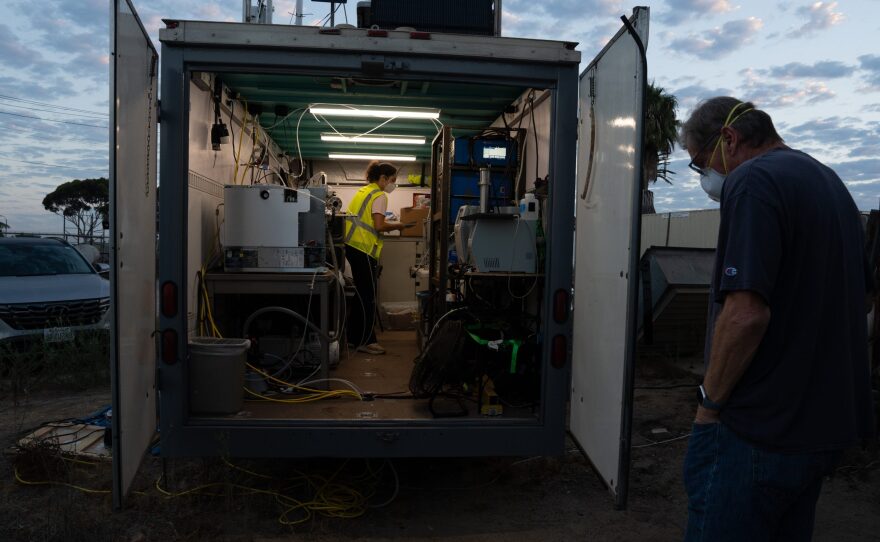There are now four lawsuits accusing the contractor running the federal sewage treatment plant on the U.S.-Mexico border of mismanagement and contributing to the Tijuana River sewage crisis.
Frantz Law Group opened a mass tort case last month against Veolia Water West and its manager Mark Wippler, accusing them of illegally discharging hazardous chemicals into the Tijuana River, as well as failing to operate, manage and maintain the plant in compliance with the San Diego Regional Water Quality Control Board’s mandates.
This case and another lawsuit filed by the firm Singleton Schreiber last month mark a growing momentum to cast a wide net in search of plaintiffs who say they have experienced a range of damages caused by Veolia releasing toxic sewage into South Bay waters. They are the same kind of lawsuit that well-known environmental advocate Erin Brokovich filed against Pacific Gas & Electric for contaminating groundwater.
The two lawsuits, which take into account how chemicals in water pollute the air, also mark a new movement in environmental litigation, according to environmental law professor Robin Craig who recently moved to the University of Kansas from the University of Southern California.
“Aerosolization has really become kind of a new frontier with water pollution,” Craig said.
The Frantz lawsuit says Veolia’s negligence has seriously harmed the health of South Bay residents, as well as reduced the value of their properties and impacted business revenue. The lawsuit also accuses the defendants of trespass for allowing noxious fumes to flow over property lines causing headaches, respiratory and gastrointestinal issues.
“Imagine the sewage is everywhere, and the smell, and it's in the air, and whatever odorants they have, and whatever chemicals in the odorants, that's trespass on your property,” said James Frantz, the law firm’s CEO.

The lawsuit comes after scientists from Scripps Institution of Oceanography and the University of Texas at Austin and San Diego State University have raised alarms about health concerns as a result of the sewage, including aerosolized pollutants emanating from the river they said were concerning for public health.
A company spokesperson for Veolia said that unprecedented flows from Tijuana are to blame, as well as a lack of government funding for maintenance and building out more capacity at the plant. The spokesperson also took a swing at attorneys bringing forth the legal claims.
“No amount of dishonest rhetoric from opportunistic lawyers can change these facts, and we will defend ourselves against their baseless accusations,” the spokesperson said. “Veolia has done an excellent job helping to operate the South Bay International Wastewater Treatment Plant despite these challenges, and we look forward to working with our government partners to help bring about a long-term solution.”
The Biden administration recently proposed $310 million in new funds for the federal plant, in addition to $400 million already secured. Congress will have to approve the funding.
The International Boundary and Water Commission, the federal entity responsible for the plant, estimates that its current buildout and repair project will cost $600 million and take at least five years to complete.
“This additional funding, if approved, could give us the option of expanding the plant's capacity beyond current plans, accelerating the timeline to finish the recently announced rehabilitation and expansion, or a combination of both,” said IBWC spokesperson Frank Fisher in a statement to inewsource.
The legal approach of using a mass tort, which allows multiple plaintiffs to join a group lawsuit while still holding individual claims, can be particularly effective when used against a large private company whose alleged errors have led to a wide array of impacts.

UC Los Angeles law professor Peter Reich says that if the wastewater plant was run solely by the federal government, which has limited assets, the lawsuit would be less viable.
“But once you get a private contractor into the picture, particularly a multinational corporation, there's a possibility of getting more,” Reich said.
Reich said this is potentially one aspect of the law firms’ decision making process for taking on such lawsuits.
Craig added that Veolia has a “checkered reputation.”
“It's gotten into a lot of trouble in multiple countries particularly when it takes over water supply systems, municipal water supplies,” Craig said.
Law firms usually finance the mass tort lawsuits, taking on the often hefty investment and risk of significant losses. But if they win, they can earn significant returns for both the firm and their clients.
Both Frantz and Singleton Schreiber have actively used mass torts.
Recently Frantz, along with partnering firms, secured more than $13 billion from PG&E for victims of the 2017 and 2018 fires in Northern California. He is also working in Lahaina, Hawaii, with victims of fires there. Singleton Schreiber has landed $2 billion in fire litigation over the last two years, also in mass torts.
Frantz says that there is another upside to mass torts, which is that they open up the possibility of collaborating with other law firms filing similar lawsuits under a steering committee with the aim of bolstering all the cases against the same defendant.
The Frantz lawsuit also has another particularity – one of the lawyers on the case, Kristin Westphal, is also an Imperial Beach resident, and will be a plaintiff in the case. She says she and her family have all experienced headaches, sore throats and gastrointestinal issues which they attribute to the sewage.
Westphal says that in her eyes, the Scripps team findings built momentum toward litigation.
“If you don't want scientists that are equipped to deal with this exposed to it, why would you want your children exposed to this?” Westhpal said.
The lawsuit demands that the company pay for medical monitoring.
Franz said he is expecting the case to include hundreds if not thousands of plaintiffs.








